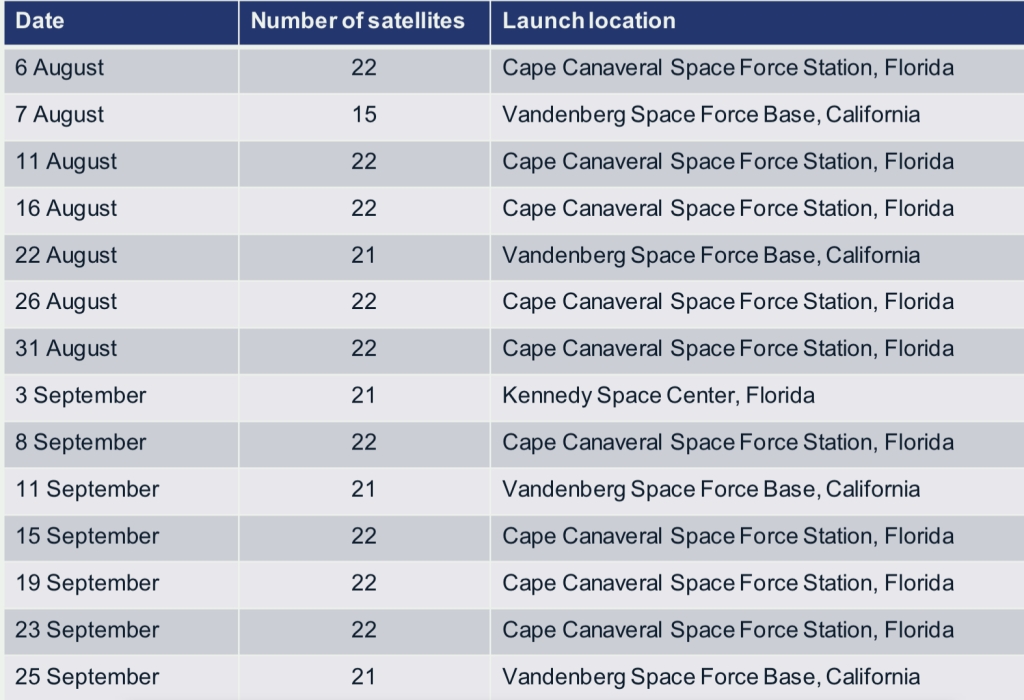5:09 am
We’re in this really strange place where we have amazing ambitions for space, including launching 100s of thousands of satellites into Low Earth Orbit (LEO), and yet at this moment in November 2023, we have only ONE single launch provider – globally – that is consistently launching rockets – SpaceX!
If you have been following me on social channels, you have no doubt seen that I often post about the emerging world of LEO-based Internet access. SpaceX’s Starlink, Eutelsat OneWeb, Amazon’s Project Kuiper… and many more. At the Internet Society, I led a team in 2022 that developed a paper looking at the overall industry. I also co-authored an article in the September 2023 Internet Protocol Journal about LEO satellites for Internet access.
I’m increasingly asked for commentary about LEO systems, and when people ask me what is the biggest challenge, my answer these days is: getting the satellites into space! (Unless you are SpaceX (or the government of China).)
We are in this weird place where all the other major launch providers are in between rocket versions. Consider:
- United Launch Alliance (ULA) – Historically NASA’s big launch provider (and a company formed by Boeing and Lockheed Martin), their new Vulcan Centaur has been delayed for years and may finally launch for the first time in December 2023.
- Arianespace – Europe’s big launch provider has had many years of delays with their Ariane 6 that has been in the works since 2014. It might finally fly in 2024 (and it’s all a financial mess).
- Blue Origin – Jeff Bezos’ rocket company has yet to launch its New Glenn rocket that would bring satellites to space. It’s been delayed and now looks for its first launch later in 2024.
Both ULA and Arianespace are running out of their previous rockets and need these new versions to start launching more satellites.
The Russians used to be a major launch provider with their Soyuz rockets, but ever since they invaded Ukraine few people will launch with them.
There are a whole bunch of smaller companies such as Rocket Labs that are starting to launch more. And some of the national space agencies such as India’s ISRO and Japan’s JAXA are seeking to do more with providing launch services.
But no one is currently able to come close to matching SpaceX in terms of consistently launching rockets!
Here’s a chart I used in some recent presentations showing their 14 Starlink launches in August and September 2023. Some of these are only a day or two apart!

And these are only the Starlink launches. SpaceX is also launching a bunch of other payloads. As of October 23, SpaceX had launched 77 rockets in 2023!
Nobody comes close! (Except the Chinese government, who are off doing their own thing.) SpaceX is doing amazing work to launch so often and so successfully.
So when Amazon is trying to get their 3,000+ satellites into LEO for their Project Kuiper, they went out in April 2022 and signed up for 83 launches with ULA, Arianespace, and Blue Origin (using an “anyone-but-SpaceX” approach). But none of these companies are launching their new rockets yet! (In October 2023, Amazon finally got their two prototype Kuiper satellites into orbit using an older ULA Atlas V rocket, of which there are still a few remaining.)
And so SpaceX has essentially a monopoly on commercial launches right now. And they are launching satellites for pretty much everyone, including competitors. (OneWeb used SpaceX for their final launches.)
Everyone else is of course trying to catch up, and a zillion smaller startups are looking to get into the launch game from “spaceports” all around the globe.
Meanwhile, SpaceX just keeps on launching… and launching… and launching…. (In fact, they have a Starlink launch planned for tonight.)
For competitive and resilience reasons, and because we’ll need a LOT more launch capacity to fulfill all the fevered LEO dreams, I do hope we see the other companies getting their rockets online soon. We’ll see!
But in the meantime, if I’m asked what the biggest challenge is for (non-SpaceX) LEO systems… it’s getting them actually launched!
See you soon,
Dan
P.S. There’s a whole other conversation that can be had about whether all of these rocket launches are actually good for our climate, the environment, etc. Thankfully we’re starting to see some academic papers and reports looking into all of that. But that’s a topic for another day…
Connect
The best place to connect with me these days is:
- Mastodon: danyork@mastodon.social
You can also find all the content I’m creating at:
If you use Mastodon or another Fediverse system, you should be able to follow this newsletter by searching for “@crowsnest.danyork.com“
You can also connect with me at these services, although I do not interact there quite as much (listed in decreasing order of usage):
- LinkedIn: https://www.linkedin.com/in/danyork/
- Soundcloud (podcast): https://soundcloud.com/danyork
- Instagram: https://www.instagram.com/danyork/
- Twitch: https://www.twitch.tv/danyork324
- TikTok: https://www.tiktok.com/@danyork324
- Threads: https://www.threads.net/@danyork
- BlueSky: @danyork.bsky.social
Disclaimer
Disclaimer: This newsletter is a personal project I’ve been doing since 2007 or 2008, several years before I joined the Internet Society in 2011. While I may at times mention information or activities from the Internet Society, all viewpoints are my personal opinion and do not represent any formal positions or views of the Internet Society. This is just me, saying some of the things on my mind.
Leave a comment